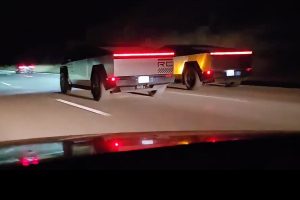Key Points
- 🚗 The French Automobile Distribution Federation (FEDA) has issued a warning about the risks associated with giga press technology in vehicle production.
- 💡 Giga casting involves using mammoth machines to produce entire vehicle parts in a single block, reducing the number of parts needed and saving costs.
- 💰 FEDA is concerned that giga castings could lead to higher repair costs for consumers if ‘mega-parts’ need replacement.
- 🌍 Environmental concerns are raised, as giga-casted parts may require more material and energy to produce and could be challenging to recycle.
- 📝 FEDA is calling on the government to assess the risks associated with giga castings and take appropriate measures if necessary.
- 🏭 Tesla’s use of giga-casting has been successful and cost-effective, and the severity of crashes compromising these parts is questioned.
- ♻️ Tesla and other companies are actively promoting the recycling of giga-casted components, challenging FEDA’s concerns about potential “giga waste.”
The French Automobile Distribution Federation (FEDA) recently issued an alert about the risks of giga press technology. As per the federation, the growing practice of using giga castings in the vehicle production process carries risks for the auto industry.
Giga casting is a manufacturing process that involves the use of mammoth machines to produce entire parts of a vehicle in a single block. This can reduce the number of parts needed to assemble a vehicle and lead to cost savings for manufacturers. Tesla used this system for the Model Y, its best-selling vehicle, and it worked very well. The Model Y is a profitable and safe mass-market EV that became the world’s best-selling car earlier this year.
In a press release, FEDA noted that it is concerned that the use of giga castings could have significant environmental and financial consequences for consumers. The FEDA highlighted that this could be the case if vehicles that are built with giga castings are in need of repair.
“The risks are real. They deserve to be anticipated and, as far as possible, avoided. The first weighs on household budgets, with repairs that are far more costly in the long run, when a ‘mega-part’ has to be replaced,” the FEDA wrote.
FEDA also argued that the use of giga castings could lead to increased environmental waste. This would reportedly be the case since the production of large vehicle components requires more material and energy than the production of smaller components. FEDA also suggested that giga-casted parts may be more difficult to recycle.
FEDA is calling on the government to assess the risks of giga castings and to take appropriate measures to mitigate their use if needed.
“FEDA therefore believes that this development could ruin long-standing efforts to restore purchasing power to households, but also to accelerate the automotive industry’s ecological transition and encourage vehicle repair. It therefore calls on the government to assess the risks of a rapidly expanding practice and to take appropriate measures to ensure that ‘giga casting’ does not become synonymous, in the near future, with “giga-wasting” and far more expensive repairs costly repairs for motorists,” FEDA wrote.
There is a reason why Tesla’s giga-casting system has become a trendsetter among other automakers in the industry. The solution works, and it helps with production costs. One could also argue that the FEDA’s concerns are not that founded since crashes that would be capable of compromising a giga-casted part are likely severe enough to total a vehicle. Companies like Tesla are also actively pushing for recycling giga-casted components, so the FEDA’s concerns about possible “giga waste” in the future seem a bit unfounded.





